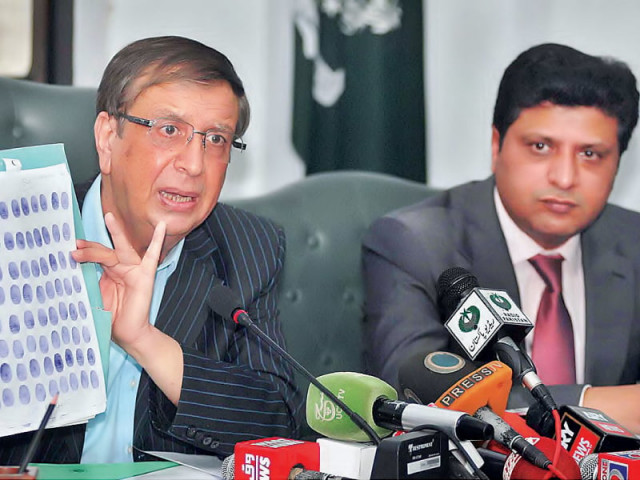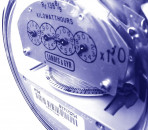Election fraud: The curious case of magnetic ink
Election commission to take action against polling staff who did not use the approved ink for thumb impressions.

The ECP secretary and NADRA chairman address a press conference. PHOTO: APP
The Election Commission of Pakistan has decided to take action against those who defied clear instructions to use approved magnetic ink for thumb impressions of voters on counterfoil of ballot papers, The Express Tribune has learnt.
The decision was taken after the National Database and Registration Authority (Nadra) apprised the commission that instead of the specified magnetic ink required for biometric verification, regular ink was used during polling in two National Assembly constituencies of Karachi, NA-256 and NA-258.
While post-election tribunals are hearing complaints of rigging, the tribunal dealing with Karachi region sent a record of the cast votes at some polling stations to Nadra for verification.
In NA-256, 57,000 ballot papers could not be verified because the thumb impressions on these ballots were marked with regular ink. Of those that could be verified, there were 5,893 duplicate or multiple votes cast. Over 11,000 used counterfoils had invalid CNIC numbers written.
Nadra chairman Tariq Malik, at a joint press conference with election commission secretary Ishtiak Ahmad Khan, told reporters that his organisation could authenticate only those counterfoils that contained thumb impressions with enough ridge, which were readable in the fingerprint software.
It is not just Nadra’s software but any software in the world cannot authenticate such fingerprints unless the specified ink is used, he explained.
However, Malik clarified that it did not mean that all of these votes were bogus. Nadra is only providing technical support and all stakeholders including the media and political parties should not draw any conclusions, he said. “We have submitted our findings based on technical expertise only,” he added.
It is unknown whether the magnetic ink was never sent to the polling stations in the two constituencies or was the ink changed in collusion with the respective polling staff. Many believe that the polling staff was in cahoots with those who masterminded the plan to rig the polls.
According to the record of communication between Nadra and ECP in July last year, Nadra had submitted a proposal to the latter to purchase magnetic ink so that thumb impressions on voter lists can be verified.
The ECP sent two samples to Nadra for testing on July 24, 2012. On July 27 last year, Nadra reported that both the samples did not meet the requirements.
On September 10, the same year, ECP sent Nadra more samples received and on September 12, Nadra replied that one sample passed the test and recommended for that ink to be used.
The ECP sent NADRA another sample on December 14, 2012. Nadra responded by saying that the latest sample failed the test and again asked for the sample sent on September 12 to be used.
More samples were sent in February 2013, which failed.
In yet another meeting in March 2013, Nadra told the election commission and the Pakistan Council of Scientific and Industrial Research the properties of the ink and the inkpad, stressing on the need for the September 12 sample.
Why different samples were being sent to Nadra despite one being approved is still unclear.
Meanwhile, ECP secretary Ishtiak Ahmad Khan was of the view that the entire electoral exercise should not be discredited because of a few constituencies. The system has started working, he said, adding that ECP had already asked for bogus votes to be tracked. “Let the system work and nobody would dare to indulge in malpractices.”
A total of 14 post-election tribunals were set up across country to address complaints of election rigging. Headed by a retired high court judge, five tribunals are working in Punjab and three each in the rest of the three provinces.
ECP had forwarded around 400 election petitions to these tribunals who are bound to decide cases within 120 days of receiving a case. So far, election tribunals have sought Nadra’s help for thumb-impression verification for four National Assembly and four provincial assembly constituencies. All these constituencies fall in Karachi and Sukkur.
So far, no tribunal has opted for thumb-impression verification in any other province.
Published in The Express Tribune, October 10th, 2013.



















COMMENTS
Comments are moderated and generally will be posted if they are on-topic and not abusive.
For more information, please see our Comments FAQ